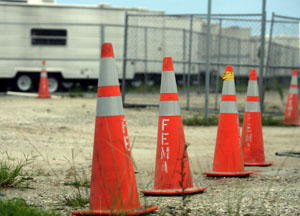Several Congressmen want to know why the Federal Emergency Management Agency’s infamous formaldehyde trailers have made a reappearance in the Gulf despite orders that they be barred from use as housing.
As we noted before, the decision to auction off the trailers generated plenty of controversy earlier this year, with critics warning that the trailers might end up being sold to people who had no idea of their origin and health concerns. The Commerce, Trade, and Consumer Protection Subcommittee of the House Energy and Commerce Committee held a hearing on the trailers on April 28, shortly after the explosion of the Deepwater Horizon but before people had a sense of how bad that disaster might get. Among the concerns raised in that hearing was that FEMA and the General Services Administration had never actually had the trailers tested to see how hazardous the levels of formaldehyde might be. House members questioned whether it was possible to ensure that the trailers would not be used as housing.
Now committee chairman Henry Waxman (D-Calif.) and subcommittee chairman Bobby Rush have a message for FEMA and GSA: We told you so. The pair sent a letter to GSA head Martha Johnson and FEMA head Craig Fugate asking why the “rigorous measures” they were assured would be implemented to guarantee that the trailers would not be used for housing clearly have not been followed. “Despite these precautions, it appears that these toxic trailers are once again being used for housing in the Gulf Coast,” they wrote.
At the hearing, they write, GSA and FEMA said they “believed the units no longer contained dangerous levels of formaldehyde,” but also that because the agencies “failed to test the actual units, this claim could not be verified.” Of course, the prospect of them being used for the oil disaster was not even on the radar then. “But even then it was easy to anticipate what we are now seeing—buyers using these trailers for housing, and doing so with no warning or understanding of the serious health risks associated with formaldehyde,” they write. “If we all saw this coming, why did it happen anyway?”
The lawmakers sent a list of questions to both agencies about they were not better prepared for this and didn’t do more to protect people from these trailers. Here’s the full letter.













